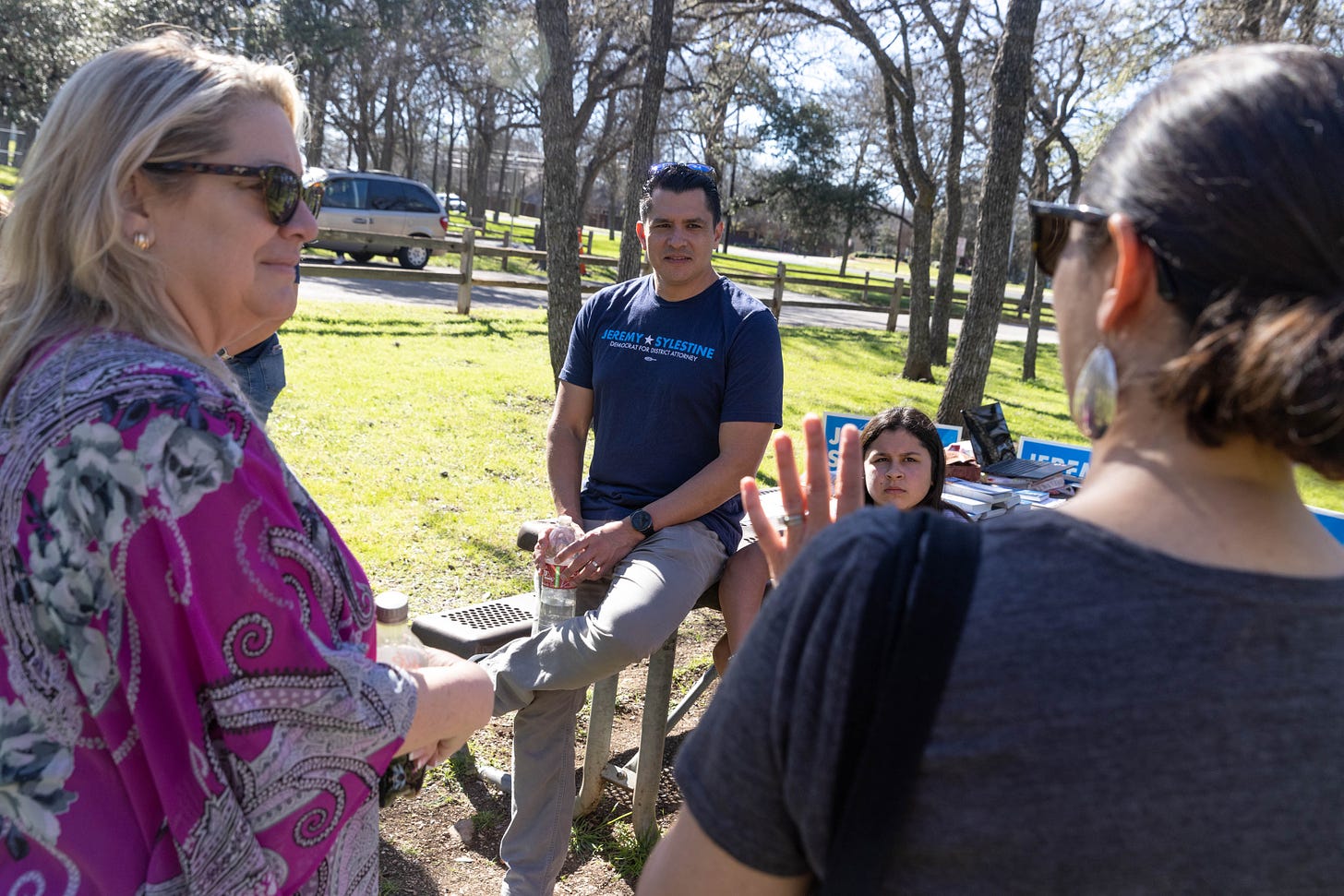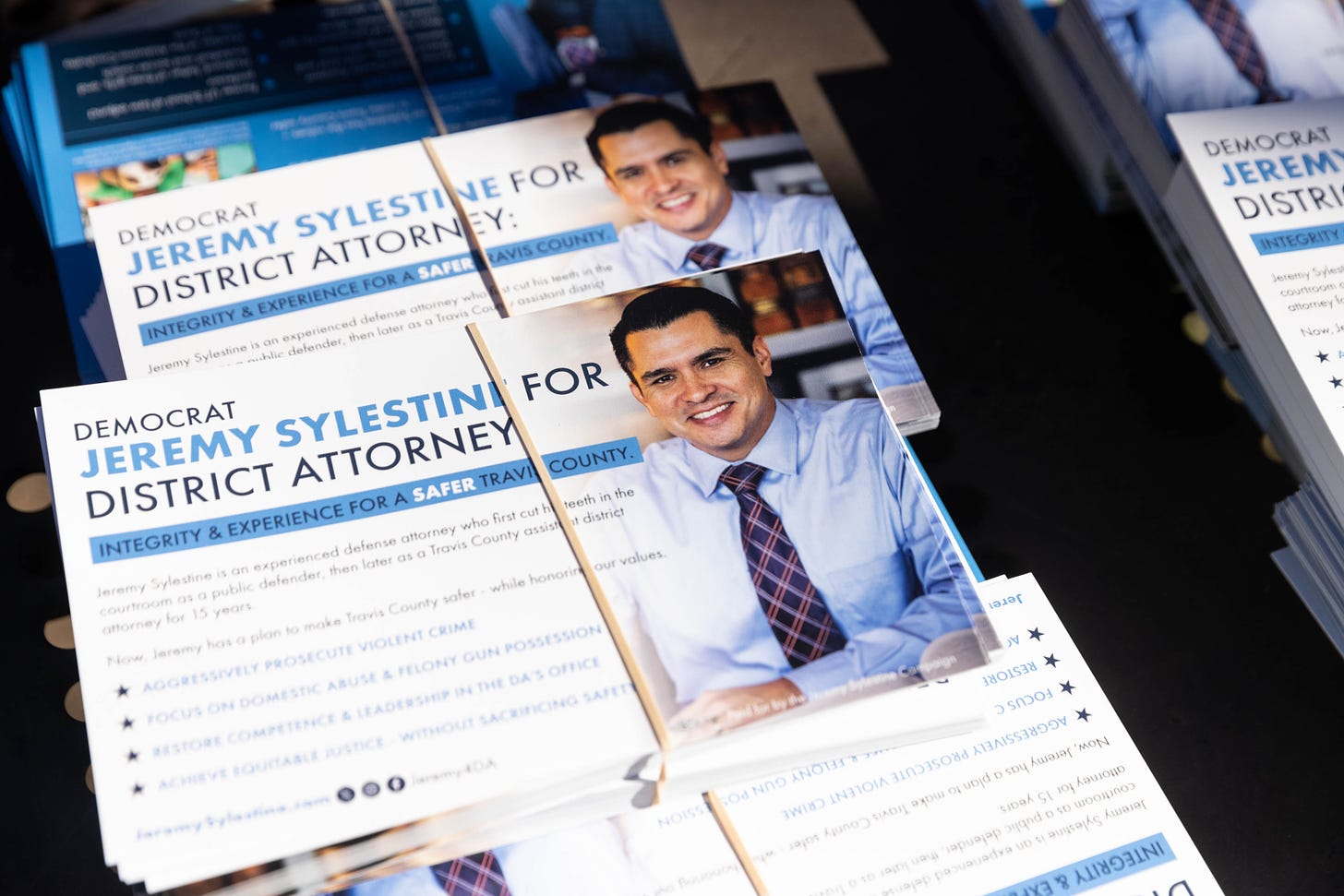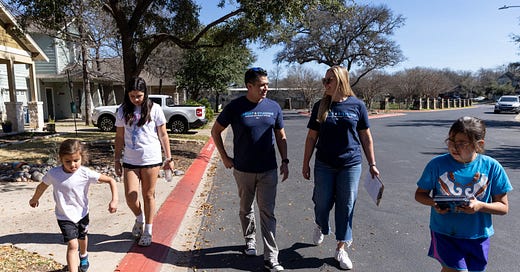
The Free Press

AUSTIN, TX — Early last December, a billionaire named Daniel Lubetzky, who had moved to Austin, Texas, from New York City during the pandemic, hosted a meeting of civic leaders and businesspeople in the city. The number one subject on everyone’s mind was Austin’s troubling crime rate.
According to FBI crime statistics, as of October 2023, crime was higher in the Texas capital than the average number of murders, aggravated assaults, and robberies in the rest of Texas—and the nation. Violent crime, for instance, was nearly 40 percent higher in Austin than the national average. Meanwhile, since 2021, felonies were being knocked down to misdemeanors, criminals were avoiding jail time altogether, and victims were feeling ignored by the system. The number of criminal cases waiting to be prosecuted had reached an astounding 7,000.
The group agreed that one person in particular was to blame: Travis County district attorney José Garza, a 44-year-old former workers’ rights attorney. Garza swept into office after the Black Lives Matters protests, backed by groups funded by George Soros. Like other Soros-supported DAs across the country, including George Gascón in Los Angeles, Larry Krasner in Philadelphia, and Chesa Boudin in San Francisco, Garza promised to make the criminal justice system more humane—eliminating most drug possession prosecutions, calling for fewer and shorter sentences, holding the police to account. But this progressive agenda simply hasn’t worked.

“You can literally connect Garza’s policies to these outcomes,” Lubetzky told me over the phone recently. “I’m independent, but I’ve voted for Democratic presidents my whole life. But this is a case of ideological extremism harming our community. I asked, ‘Why isn’t somebody challenging this guy?’ I had to do something.”
What he did, with the help of some other prominent Austin residents, was look for a more moderate Democrat to challenge Garza in the primary on March 5. They landed on former prosecutor Jeremy Sylestine, who had previously spent 15 years in the Travis County DA’s office. A Native American who grew up on the Alabama-Coushatta reservation in East Texas, Sylestine has lived in Austin since 2006 and went into private practice in 2021, eleven months after Garza took office. And though he had assumed his days as a public servant were over, the group persuaded him to throw his hat in the ring.
“I felt like I’d given all I had to Travis County,” Sylestine, 44, told me when I visited Austin last month. “I was ready to make some money and do well for my family. But I knew what was happening, and it was concerning. Seeing Travis County move in the wrong direction really affected me.”
Given that Austin is a Democratic stronghold, the real race for DA will be decided on Tuesday, when the primary is held. In blue cities across the country that elected progressive prosecutors post-George Floyd, the pendulum is already swinging back. Virtually all progressive prosecutors elected in 2020 are facing a backlash from citizens upset at their leniency towards criminals. The policies of San Francisco district attorney Chesa Boudin proved so unpopular that he was recalled in 2022. In Los Angeles, DA George Gascon is facing 11 opponents, all of them vowing to reverse his reform agenda. In Austin, this race will signal whether Democrats in the Texas capital have also had enough of the progressive criminal justice reforms that have become a pillar of the party.

The fight, so far, has been bloody, with Austin progressives trying to tar Sylestine as a Republican stooge who wants to roll back progress. In a February 21 open letter to Sylestine, ten Texas Democrats, including Squad member Rep. Greg Casar, accused him of accepting donations from wealthy backers who have contributed to GOP politicians. It demanded, in part, that he stop “parroting Republican talking points and attacks,” which “embolden fringe elements and pose a risk to the safety of public servants and their families.” The letter concluded: “Republican money and attacks are antithetical to the values of the Democratic Party in Travis County.”
When I met up with Sylestine the last weekend of February the letter was still very much in the zeitgeist. The candidate, however, seemed unperturbed. Sitting across from me at a picnic table in an Austin park, Sylestine replied that yes, some of his donors had contributed to Republicans as well as Democrats. (Lubetzky has contributed to both Joe Biden and Nikki Haley, for instance.) But “this is not a Republican or Democratic issue,” he said. “This is about crime and that touches everybody, whether you’re conservative or liberal. I think I appeal to somebody who is smart and has common sense and just wants someone who can do the job.”
Sylestine may have never run for office before, but he sure looks the part: ruggedly handsome, unbothered by tough questions, and able to get his talking points across like a pro. His problem, politically, is twofold. First, he jumped into the race so late (on filing day, December 11) that he had only two and a half months for voters to get to know him before the primary. Second, while hard-left progressives can be expected to vote in the primary, it’s more difficult to motivate moderate Democrats to go to the polls. And if he has a hope in hell of winning, that’s what Sylestine needs to do.
His advantage—if anyone dares call it that—is that everyone in the city is talking about the crime wave. Many of the city’s most buzzed-about new residents—and some of its wealthiest—came to Austin because they were looking for a livable alternative to California. They’re worried that if Garza stays in office, Austin will wind up as the next San Francisco.
“Those of us who came here from what I call a failed state are warning, ‘Hey, guys, you don’t want to do this,’ ” Peter Attia, the longevity guru, who moved from San Diego, California, to Austin, told The New Yorker last year. He added, “I’ll show you what it looks like to have needles in your front yard, and what it feels like when you’re uncomfortable leaving a restaurant.’ That’s why we left.”

Over breakfast one morning, Lawrence Wright, the Pulitzer Prize–winning author—and an old friend from the 1980s when I lived in Austin—had his own take on the explosive crime rise in the city. Much of it was due, he believed, to the disappearance of cops on the beat. “The police were very alienated because they would make arrests, only to see that there would be no consequences for the people they arrested,” Wright told me. What’s more, the Austin City Council voted to cut the police budget after the BLM protests—a “defund the police” gesture popular with the city’s progressives.
Garza’s efforts to hold police to account for misconduct has only made things worse. In 2022, for instance, he indicted 21 cops for “use of excess force” during the Black Lives Matter protests—only to abruptly drop 17 of those indictments a year later. At the same time, cops were quitting in droves—and there were no replacements in sight. Austin’s police department is now down 500 officers on a force that should number 2,000 when it’s at full strength.
Wright told me that the absence of police has resulted in the homeless population taking over a lakefront area that families had used for decades. “All the public spaces the homeless began to occupy were unpoliced,” Wright said. “And there was a lot of criminality.”
He added, “What you see in Austin now is a lot of lawlessness. And that is absolutely the consequence of the absence of obvious policing.”

When I met up with Garza, he too was in a park, surrounded by volunteers he was hoping to fire up before they headed out to knock on doors. It was clear that he had not expected an opponent, and now that he had one, he was determined to paint Sylestine as a Republican—the kiss of death in liberal Austin. “As many of you know,” he told the volunteers, “we’ve drawn an opponent in the Democratic primary, and our opponent is supported by deep-pocketed Republican donors who want to undo all the progress we’ve made.” Not that he was worried. “We are going to win convincingly on election day.”
Garza is a small, wiry man with a wisp of a mustache. When he first ran in 2020, he had no prosecutorial experience—which he claimed gave him an outsider’s insight into how to fix the problems with the DA’s office. When I asked him why he had wanted the job in the first place, he told me that his time as a public defender, early in his career, had impressed upon him the inequities of the system, and he thought he could be a force for change. “Here in Travis County, the most progressive county in the state, we should be a leader in building a criminal justice system that treats everyone fairly and improves our safety as a community.”
So, I asked, what does he say to those who claim crime has soared since he took office? Garza said they were simply wrong. “My opponent makes it sound like it’s Mad Max Thunderdome here, and that’s just not the case,” he said. “I’m really proud of my record over the last three years. Forbes magazine said we were one of the 15 safest cities in the country.” (I checked: it was true for 2023, but it ranked last on the list at number 15, below Boston, San Diego, and even New York City.) He went on: “We have a lower violent crime rate than such ‘liberal bastions’ as Lubbock, Amarillo, and Beaumont.” Not only that but since he took office, Garza said the homicide rate in Austin was down 20 percent, violent crimes were down 10 percent, and property crimes were down 15 percent. “So I think our approach is working.”
When I later asked Garza for a source for his data, he pointed me to crime statistics compiled by the Austin Police Department. Sure enough, many crimes were down between 2022 and 2023. But if one took 2021 as the starting point, the year Garza became the DA, all the major crime categories had increased substantially, including murder, aggravated assault, and arson. And, as several Sylestine supporters pointed out to me, some of the less severe crimes, like burglary and larceny, were likely down because Garza’s office wasn’t prosecuting them.

“We’ve increased the number of sexual assault convictions from the last administration,” Garza told me. “We’ve held people accountable for acts of violence. But we’ve also been hard at work addressing the root causes of crime in our community and reducing our reliance on incarceration.”
But try telling that to the victims of sexual assault and other violent crimes—especially women who say Garza’s policies actually deprived them of justice. Victim advocates can cite plenty of examples: there was the case of Santos Celso-Flores, who participated in a gang rape of a 13-year-old girl, got out on a $40 bond, and then, back on the streets, allegedly raped two more teenage girls. Or Richard Adeyemi Williams, who in a fit of rage repeatedly raped and strangled his ex-girlfriend. After pleading guilty, Williams spent 90 days in prison, and received a “deferred adjudication” from Garza’s office, meaning the crime will be erased from his record after five years.
In June 2021, Lynn Isaak became one of Austin’s crime victims, attacked by a predator named Antonio Cordero Rios during her morning run. Though she fought him off, her leg was shattered; she says she will never be able to run again. And after Rios was arrested, other women came forward to say he had done the same to them. But instead of taking Isaak’s case to a jury, Garza cut a plea bargain with Rios, allowing him to accept 10 years’ probation in lieu of jail time.
“I do not believe the outcome of this case was just,” Isaak said in a statement. “Nor do I believe it will protect women and children in our community.” Her lawyer, Kelsey McKay, who has represented numerous crime victims during Garza’s tenure, says “José’s implementation of progressive policies [is] diametrically opposed to protecting victims.” In an email, she added, “The truth is, I don’t think José ever was (or will be) a DA who fights for victims or prioritizes their protection.” Garza, for his part, insists that crime victims are a priority for his office. On the home page of his campaign website, in all caps, are the words STANDING WITH SURVIVORS.
Last week, just days before the primary, Lubetzky wrote a long, anguished post on X, giving example after example of Garza’s unwillingness to prosecute criminals, and pleading with Austinites to vote on March 5. “The stakes are so high for Austin,” he wrote.
Toward the end of the post, he added:
“It took me months to understand why. . . Jose Garza would allow a violent criminal who drugged and raped a 13 year old girl to get off without anything on his record. . . . Under Garza’s simplistic ideology, everyone is a victim or an oppressor based on their background and position in society rather than based on their actions and behavior. For Garza, the criminals that commit violent crimes are the victims so even if they committed rape or murder they cannot be at fault. It’s the system’s fault.”
Lubetzky concluded: “It’s so extreme it’s illogical. But that’s what radical extremism does.”

Can Sylestine win tomorrow’s primary? It’s possible, but it would be an upset. In a very short time, he has raised and spent $1.25 million, allowing him to gain some visibility with voters. Garza has refused to debate him, which suggests that the incumbent views his challenger as a threat. There is no published polling data, but Garza told me his campaign’s internal polls make him “incredibly confident that the voters are enthusiastic about the progress we’ve made.” Bill Miller, the savvy, Austin-based political consultant, agrees. “He’ll probably win easily,” he told me. Still, I spoke to some traditional Austin Democrats who felt Garza’s win in 2020—in the wake of all the anger and political unrest sparked by the death of George Floyd—was a fluke, and after three years of progressive policies, the city is ready for a return to law and order.
What Sylestine needs most of all is for moderate Democrats to treat the Democratic primary as if it were the general election—and not cede it to progressives.
“There are thousands of folks who live in the middle space, whether it’s on the right side of the middle or the left side of the middle, who are left out in the primary process in Austin,” he says. “We’re trying to make room for them to stand up and say it’s okay to be here.”
Joe Nocera is a columnist for The Free Press, and the co-author of The Big Fail. Follow him on X (formerly Twitter) @opinion_joe. And read David Josef Volodzko’s Free Press piece, “The Black Activist Trying to Save Oakland from ‘Phony’ Woke Progressives.”
To support more of our work covering this election year, become a Free Press subscriber today:














Garza won. Hard to feel badly for those who voted for him and then complain about crime.
"But if one took 2021 as the starting point, the year Garza became the DA, all the major crime categories had increased substantially, including murder, aggravated assault, and arson. "
Probably more clear to say 2020 as a baseline year before he became DA. Or Jan 1 2021 as a baseline date if you want to compare monthly data. Matt Yglesias is bashing you thoughtlessly over this, but you're totally right.